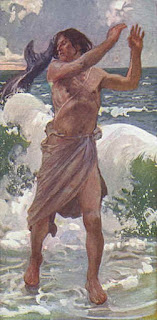by Cowboy Bob Sorensen
When reading some of the battles in the Bible between Israel and the pagan nations, we see that the pagans had gods for practically everything. They were also territorial, and thought Yahweh was like their false gods. You may recall in 1 Kings 20:23, Syria thought Israel had gods of the hills, so they could do better fighting in the plains. It did not go well. Many times in Scripture, God declared that he is above the false gods of their imaginations, and that he is the Creator.
A similar pagan theme was used in the unremarkable 1978 movie The Manitou. Native American mythology was used, combining animism and pantheism. (The Great Spirit is called the Gitchi Manitou in Algonquin. Manitowoc in Wisconsin supposedly has its name based on this.) Everything has a manitou, or spirit, even inanimate objects. In the movie and book, one particular manitou was being reincarnated, and it was both powerful and extremely angry. It had to be stopped.
The medicine man Singing Rock said, "Your God won't help you. Nothing in your Christian world will help...not prayers, not holy water, not the weight of a thousand of your churches." (In the book of the same name, author Graham Masterton indicated that he has an invincible repugnance toward God.) Essentially, drop the God of the Bible and deal with the demon on its own terms.
Yahweh is outside the confines of time and space, and is the Creator of the universe. A simple lesson from The Manitou is that often times, Christians let unbelievers and others who reject the authority of the Bible control the discussion. "Be neutral. Leave the Bible out of it." Those who demand neutrality are not neutral themselves. If someone agrees to this, they have just admitted that the Bible is wrong about them and their worldly wisdom! So much for the authority of, and obedience to, God's Word.
Recently, an atheist on Fakebook rejected creationist material (which he steadfastly refuses to read or watch) and demanded "unbiased" sources. I've got some bad news for you, sunshine, anyone who is trying to make a point is biased. Further, that same tinhorn claims to only accept material from "legitimate" peer-reviewed sources. For him, it means atheistic naturalism, so the ad hominem and genetic fallacies shield the misotheist and keeps him in his echo chamber. He wanted to control the discussion.
 |
| The Prophet Jonah, James Tissot, possibly around 1898 |
God wasn't letting him get away with getting away. Jonah got on a ship, but God brought up a storm. Note how in Jonah 1:9, when confronted he said that God is the Creator. The fellow passengers realized that he doesn't just serve a local god of the hills, plains, a city, or whatever. They took notice. After they reluctantly threw him overboard, the sea calmed. It is not unreasonable to think that even in Jonah's disobedience, seeds of repentance were planted. That is, some of the others on the ship may have been converted. We'll never know this side of Heaven.
Like the account of creation, the narrative of Jonah is often written off. So are is the account of Noah and other things because "science says." This is horribly inconsistent for the Christian. Jesus affirmed all of those as actual events, not myth or allegory. Professing Christians who want to look good to the enemies of God and reject creation, Noah, Jonah, and so on are calling Jesus and other people in the Bible liars. That's a bad place to be. Also, why trust the Resurrection of Jesus, which "science says" is impossible, but reject the Genesis Flood, six-day creation, the dispersion at Babel?
Here is a discussion of things we can learn from Jonah. You can see how it inspired this article. To do so, click on "Jonah’s witness to the Creator God."
